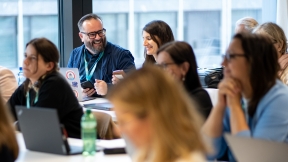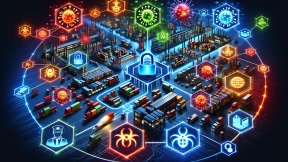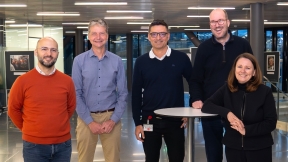Collaboration helps the Internet stay resilient
At this year’s Domain pulse, industry experts met in Winterthur on 6 and 7 February to discuss the security and stability of the Internet. In order to make the Internet more resilient against cyber attacks in times of international conflict, close cooperation with organisations operating critical infrastructure is crucial.
Around 250 participants from registries, Registrars, hosts, federal government offices and other experts accepted the invitation. Under the title ‘Internet as critical infrastructure: Maintain sovereignty and protect from abuse’, they discussed the current challenges facing the Internet industry. The focus was on how policy makers and operators of critical infrastructure can maintain sovereignty over the Internet, protect it from attacks and make it more resilient in times of international conflict.
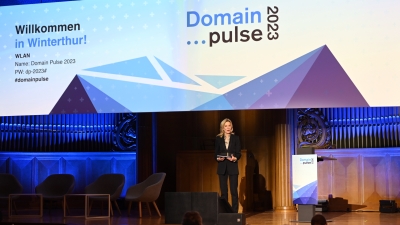
Around 250 participants from registries, Registrars, hosts, federal government offices and other experts accepted the invitation. Under the title ‘Internet as critical infrastructure: Maintain sovereignty and protect from abuse’, they discussed the current challenges facing the Internet industry. The focus was on how policy makers and operators of critical infrastructure can maintain sovereignty over the Internet, protect it from attacks and make it more resilient in times of international conflict.
Thought-provoking images
The event was kicked off by Marc Elsberg, best-selling author of the science thriller Blackout. In his book, the whole of Europe sinks into darkness, fear and terror after an attack on the electricity grid. Vital areas such as water, petrol and food collapse as a result of the blackout.

What advice does Elsberg give experts to prevent a blackout? ‘I tell stories and paint big pictures. In this way, I point out things that you may not have seen before and put them up for discussion. Experts then take these up and use them to draw conclusions. That’s more what my job is, as opposed to giving advice.’
Between cooperation and confrontation
Internet governance expert Wolfgang Kleiwächter explained how international conflicts can affect the operation of the Internet as critical infrastructure. He pointed to a growing divide on the Internet. On the technical level, cooperation still works well, but on the level of Internet applications there is more and more confrontation. For example, the Western world is discussing sanctions against Huawei and TikTok, while China bans Google and Facebook services.
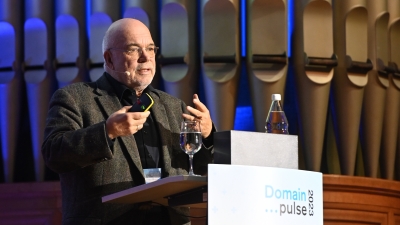
‘A country can only exercise its sovereignty at the level of Internet applications, but not in the provision of global technical resources,’ Kleinwächter explains in an interview with Switch. Commenting on the role of Switch at the level of applications for Internet security, he says: ‘Switch has always been an organisation that others want to learn from. Like the DNSSEC security standard. Switch does this calmly without creating a lot of attention for itself. It just works. They deserve a great deal of respect.’
Supply chains as the biggest risk
This was followed by Hans-Peter Käser, project manager for the implementation of the National Strategy for the Protection of Switzerland from Cyber Risks at the Federal Office for National Economic Supply, who then took the stage. He presented ways in which Switzerland can ensure the supply of essential goods and services in critical sectors, working in close cooperation between government and business, using control measures and mandatory storage requirements. The ICT minimum standard set for different industries to improve their digital resilience plays an important role. However, Käser sees the greatest risk in the area of supply chains. It is not possible to manage the risks of a supplier’s supplier. Complex, globally optimised supply chains endanger our security of supply.
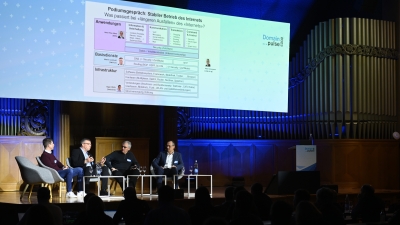
In the ensuing panel, Käser, led by Peter Heinzmann, founder of cnlab, held discussions with Martin Leuthold, Head of Data, Security & Network at Switch, and Roger Wirth, Head of Cyber Security at Swissgrid. Amongst other things, they highlighted a scenario in which the power supply is still functioning but the Internet as a communication infrastructure suffers a total failure.
Martin Leuthold put it into perspective: ‘Thanks to the decentralised structure of the Internet, I think such a scenario is extremely unlikely. For the .ch top-level domain, we are working with three major Anycast providers. On our behalf, they publish the current zone file containing all active .ch domain names at regular intervals. Only a state actor would be able to make such a huge effort that all three providers would fail completely at the same time. For conventional cybercriminals, there are much easier ways to get money.’ Nevertheless, Leuthold added: ‘After the pandemic-related interruption, the time has come to operationalise the crisis plans developed in the sectors and sub-sectors with joint exercises in order to further increase the resilience of the Swiss Internet.’
Lack of public discourse
Adrienne Fichter, editor at Republik, and Nicolas Zahn, IT consultant and project manager at the Swiss Digital Initiative Foundation, provided insights into Swiss network policy. Using the SkyGuide incident as an example, they illustrated the problem that Switzerland lacks a public debate on critical infrastructure. Nicolas Zahn sees the reasons primarily in how abstract the subject feels to most people: ‘We need external pressure, such as the war in Ukraine, to heighten awareness of our dependence on functioning critical infrastructure.’
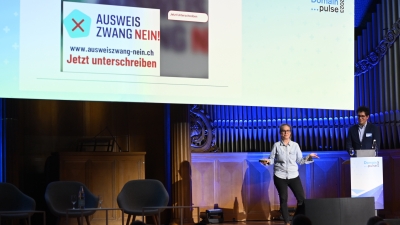
Adrienne Fichter added that Switzerland also lacks a broader understanding of national grid policy issues. Many members of the National Council and Council of States failed to understand the implications of an ID requirement under the Federal Act on the Protection of Minors in the Fields of Film and Video Games (JSFVG) in the digital space. When asked how Switch views the national grid policy, Fichter answers: ‘Switch is an important player in national network policy, contributing to many debates – whether it’s data protection-compliant framework agreements for our universities or the establishment of the new Federal Office for Cybersecurity. Switch is also a foundation that communicates technical issues in a clear and understandable way.’
The DNS for everyone and everything
Live from Australia, Geoff Huston, senior researcher at the APNIC regional Internet registry for the Asia-Pacific region, highlighted the security deficiencies of the critical infrastructure of the Internet. One of the underlying problems with the DNS is that it was developed without taking cybersecurity into account. Huston listed various measures to address this deficiency. They start by fixing DNS leaks with new protocols. The introduction of DNSSEC also plays an important role. It guarantees the authenticity of DNS responses. However, alternatives to the DNS are also being researched that are breaking new ground.
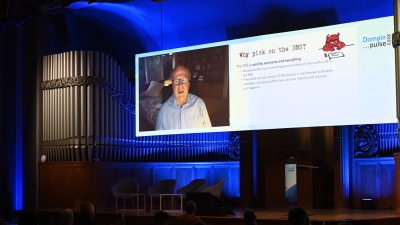
The organisers
Together, the registries of the national TLDs .de of Germany (DENIC eG), .at of Austria (Nic.at) and .ch of Switzerland (Switch) take turns to organise the Domain pulse conference. The next Domain pulse will take place in Vienna in February 2024.
Links
More information about Domain pulse: https://www.domainpulse.ch

